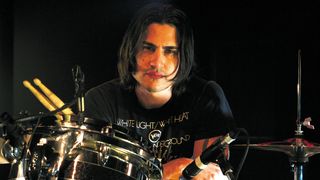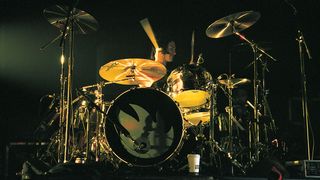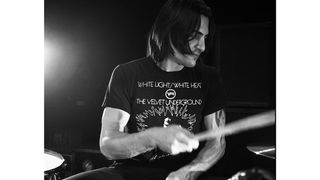Brad Wilk on Prophets of Rage, Sabbath and Alex Van Halen's swing
Rage drummer talks groove

The Prophets rise
Rap-rock trailblazers Rage Against The Machine exploded from speakers and stages with their incendiary self-titled debut in 1992.
The album was a welcome antidote to the lacking social and political commentary in music at the time.
Zack de La Rocha was the band’s fearless mouthpiece, spitting venomous rhymes that called out the perpetrators of police brutality, racism and political injustice. Behind him was a fiery musical trio: Tom Morello hammered out razor-sharp, effected riffs, and the seemingly telepathic rhythm section of bassist Tim Commerford and drummer Brad Wilk laid Zeppelin-meets-drum machine grooves beneath. Whether lighting up stages or spearheading protests, they were a force to be reckoned with.
Wilk grew up in Oregon before moving to Southern California where he started tuning into the influences that would inform his sound behind the kit. He was exposed to everything from Black Sabbath and Elvin Jones to Zeppelin and NWA. This heady mixture left its imprint on Wilk, and his signature funky, loose, swung groove was born.
In 2013 Wilk left the security of his Rage cohorts and ventured into challenging new territory when producer Rick Rubin invited him to fill in for his hero Bill ward on Black Sabbath’s final record, 13.
And now, Wilk is back with Morello and Commerford as part of Prophets of Rage. Recruiting Cypress Hill’s B-Real and Public Enemy’s Chuck D, and digging into the rap legends’ back catalogues too, Prophets of Rage was born. With this renewed purpose, Brad’s groove has never sounded more powerful or focused, and it’s high time we caught up with the Renegade of Funk.
How and why did Prophets Of Rage come to exist?
“Tom called me up and asked if I was interested in getting together with Tim and also Chuck D and DJ Lord to see what that sounded like. I’ve played with Tom and Tim for so many years I just never take for granted what our chemistry is. We can communicate almost telepathically. We got in a room, and it was great. It wasn’t until we added B [Real] in the mix that it really felt like something special was happening. There was such a great chemistry between all of us in the room. ”

Shitting bricks with Sabbath
Do you still approach the Rage songs with the same fire as you used to, or does age and wisdom give you a different perspective?
“My drum tech was telling me he was going back to old Rage clips, saying, ‘You’re playing more physically now than you were back in 2000, just before the band broke up.’ I feel like there’s such a purpose now that I can’t help but put myself physically and emotionally into these songs. We all still play every note like we mean it and we will continue to do that for as long as we can.”
You recorded drums for the last Sabbath album.
“That was an unbelievable experience for me. I remember getting the call from Rick [Rubin, producer]: ‘Hey, do you want to come over to Ozzy’s and play Black Sabbath songs?’ It was as simple as that. In my head I was like, if I play with these guys for one day in a room that’s good enough for me. On the first day I was playing War Pigs, Dirty Women, Hand of Doom, and then new stuff that they were working on. Quite honestly, I was shitting bricks. I don’t really get starstruck, but these guys were my heroes. There was obviously a chemistry there. What’s interesting in Black Sabbath is tony [Iommi] is the guy you follow, almost like the bass player of the band. He’s just this solid, unbelievably unwavering guitar player, then you have Geezer [Butler, bass] who plays in and around things. It’s such an amazingly different situation for me. It was incredible writing songs for two and a half weeks with them. We had a batch of 16 songs and then before I knew it we were in the studio recording them. We made it old school, did it on two-inch tape, no click tracks in sight.”
Did Rick or the band give you direction on your drum parts?
“Unbelievably they gave me free creative rein. The riffs were all there. They basically just let me do what I wanted to do. Rick is great in that he lets you figure it out. He may have an idea of what he wants to hear, but he lets you figure it out, which is an art.”
Bill Ward’s are some big shoes to fill...
“Every time I was playing I was thinking, ‘Would Bill ward like this, would he be okay with this?’ A lot of that was going on in my head, yet I was also like, ‘Okay, I’m a guy who has created a sound and a thing before I was in Black Sabbath, and that still had to be intact.’
“I grew up wanting to be Bill Ward and trying to learn those records on vinyl, playing parts over and over again. So much of Bill Ward is in my DNA, I would be a different drummer if I’d never heard Black Sabbath. The first Black Sabbath record I heard was actually Masters of Reality and I remember hearing the way he played and how he played that kick drum just after the snare drum just after the two-count. It was so distinctly Bill. I copped that at an early age and you hear it in Rage songs. He had a swing too. I grew up listening to big band a lot with my dad and there was always a lot of swing going on.
“The weirdest thing about that whole experience – and this is a true story – is that we recorded at [Rick Rubin’s] studio Shangri La in Malibu. I would walk outside on breaks and look out at lifeguard station number six. This was the exact place where I grew up when I was 13 or 14 years old I would bring my ghetto blaster to the beach in the summer and blast Black Sabbath. I’m just looking at this and it was such a full circle moment.”

Finding a groove
You’re best known for your groove. Did it take much development or was it always there?
“I always had an innate swing in me. I also listened to a lot of Van Halen records. Alex Van Halen grew up on swing. Out of high school I ended up going part-time to a jazz school called Dick Grove School of Music. It taught jazz, Afro-Cuban and percussion and I really got into drummers like Elvin Jones. I knew that I would never be a jazz drummer. I wanted to be a rock drummer who was influenced by jazz, rather than a jazz drummer who might be influenced by rock.
“My teacher was David Garibaldi from Tower of Power. We called him the General. He was just amazing and really taught me about ghost notes. I always listened to John Bonham and I thought his placements of ghost notes were a thing of wonderment. I’d spend hours and hours, not listening to the stuff you could hear easily, but the stuff in between what he was doing. He had such incredible hands. Funnily enough, I didn’t really ‘get’ Led Zeppelin until after I hit puberty, and I hit puberty really late! Then I really understood Led Zeppelin and specifically understood John Bonham in a whole new way. They were such an incredible band that had this groove that oozed sexuality. That was a huge part of my learning process.”
You’ve always played a simple drum set-up. How much has it changed, if at all?
“When I started in Rage I had a three-piece drumset. I had a snare drum, a kick drum, a floor tom and a couple of cowbells. On the second record I wound up adding a tom. When I went to Audioslave I added an 18" floor tom. With the Smashing Pumpkins I kept it basically the same. With Black Sabbath, if you look at the original Bill Ward kits, he had a single kick drum, 16" and 18" floors and one tom. I really kept it to that.
“Having said that, when I was 13 or 14 years old, I was enamoured with Neil Peart and I had this massive f**king drum kit. I spent time in my room learning 2112, learning all the songs off Moving Pictures, learning the Signals record. I was deeply into Neil Peart just before I got into John Bonham. I actually wound up starting with a massive kit and it slowly got smaller and smaller.”

I'm MusicRadar's eCommerce Editor. In addition to testing the latest music gear, with a particular focus on electronic drums, it's my job to manage the 300+ buyer's guides on MusicRadar and help musicians find the right gear for them at the best prices. I dabble with guitar, but my main instrument is the drums, which I have been playing for 24 years. I've been a part of the music gear industry for 20 years, including 7 years as Editor of the UK's best-selling drum magazine Rhythm, and 5 years as a freelance music writer, during which time I worked with the world's biggest instrument brands including Roland, Boss, Laney and Natal.

"Anybody who thinks they can do exactly the same thing they did 50 years ago is mad": Deep Purple's Ian Paice and others on the demands of playing drums in your 60s and 70s

"It was a fair fight that I got thrown out of the band for, because Moon came for me with a tambourine": When Roger Daltrey was fired from The Who at the worst possible time in 1965

"Anybody who thinks they can do exactly the same thing they did 50 years ago is mad": Deep Purple's Ian Paice and others on the demands of playing drums in your 60s and 70s

"It was a fair fight that I got thrown out of the band for, because Moon came for me with a tambourine": When Roger Daltrey was fired from The Who at the worst possible time in 1965
Most Popular







